Stay in the know on all smart updates of your favorite topics.
Carefree through Amsterdam on a shared bike
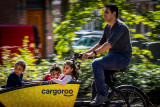
Amsterdam is investing heavily in shared transport. Shared cars, scooters and bicycles make the city more accessible. That last option is healthy, clean and popular. For those who don’t have a bike, or looking for a second bike, we have a shared bike. The city of Amsterdam will receive 1,400 shared bicycles, including 100 shared electric cargo bikes. Some are allready on the streets; the rest will follow from August 15.
Where can you find shared bikes?
At the Zuidas, along the ‘Westlijn’ of the metro, in Oost and Zuidoost. Electric shared cargo bikes can be found in Oost and Zuid. There is a maximum number of shared bicycles per area. It is a 2 year experiment. Then we'll see if we continue.
• FlickBike: 400 shared bicycles along metro stations on the ‘Westlijn’ (from Henk Sneevlietweg to Isolatorweg) and the bus to Westpoort, from 15 June
• Cargoroo: 100 electric shared cargo bicycles in Oost and Rivierenbuurt (Zuid), from 15 June
• Donkey Republic: 300 shared bicycles in Oost, from 15 August
• Soon to be announced: 400 shared bicycles Zuidoost and 200 shared bicycles Zuidas from 15 August
Where do I park the shared bike?
A shared bicycle is a good means of transport for commuters and visitors. The bicycles are usually located near a public transport junction. They have their own parking spaces and must be returned to 1 of the parking spaces of that provider. Only in those places can you stop the rent. The shared cargo bikes have their own parking space, clearly marked on the ground. You can of course park the bike somewhere else in between, but then you will continue to pay. That way the bikes won't roam, is the idea.
Note from ASC: Have a question? Let’s hear it in the comments!
Whitepaper Shared Mobility Employers (Dutch)

Due to the many working from home, employers are moving away from fixed travel allowances on a large scale and business lease fleets are also shrinking for the first time in years. In order to meet the travel needs of employees in a good way, more employers are switching to shared mobility as a financial solution.
By focusing on shared mobility, you save valuable parking space, offer your employees a flexible mobility solution and possibly save on your CO2 emissions. Research by the Kennisinstituut Mobiliteit (KiM) shows that a car sharer annually emits 175 to 265 kg less CO2 than before he started car sharing. In addition, shared mobility contributes to better accessibility of the region. Shared mobility is therefore booming: in 2020 the number of shared car users rose by no less than 42% to 730,000.
Municipality of Amsterdam is investing heavily in shared mobility
The City of Amsterdam is working hard to make shared mobility a fully-fledged alternative for everyone who wants to move around in the city. Shared mobility is one of the solutions to keep mobility, quality of life, space on the street and accessibility in the city in balance. There are experiments with shared bicycles and scooters on the street and providers of shared cars are encouraged to offer their services in Amsterdam.
Breikers supports employers free of charge in the Amsterdam Metropolitan Area
The mobility needs of every company and every employee are different. That is why Breikers provides free and independent tailor-made advice. Our interactive mobility scan is even free to use for Breikers participants! Do you need help developing your plans for the realization? In many cases you can re-enable Breikers to come up with the right solution.
To help you on your way, a white paper (in Dutch) has been prepared with the most up-to-date ins-and-outs in the field of Shared Mobility.
16% car owners considering replacing car with shared transport

Amsterdammers are a lot more positive about shared transport than day trippers and commuters, and cost savings are seen as the biggest advantage. It also appears that many Amsterdammers have old assumptions with regard to availability and costs. The municipality of Amsterdam has therefore launched a campaign to draw attention to the many advantages of shared transport.
Research
The municipality of Amsterdam has commissioned a survey among Amsterdammers, day trippers and commuters. It is clear that Amsterdammers are much more positive about shared transport (49%), than day trippers (36%) and commuters (32%). No less than 16% are considering replacing their car with shared transport. Cost savings (39%), convenience (25%) and environmental benefits (19%) are the main advantages of shared transport. The arrival of mobility hubs, MaaS (mobility as a service) apps and more insight into current car costs are also reasons to opt for shared transport.
Campaign
The campaign makes it clear to the Amsterdammer that there are many advantages when it comes to shared transport. Do you drive less than 10,000 kilometers per year? Then a shared car is quickly cheaper. And it also results in a lot less hassle. In addition, there is the freedom of choice from a wide range of bicycles, scooters and cars, better accessibility in the city and cleaner air because much of the shared transport is electric. But also more space on the street, because if we share bicycles, scooters and cars with each other, fewer means of transport are needed.
Availability significantly increased
In the past year, the supply of shared transport in the city has increased considerably. The number of shared cars in public space has risen from 1,250 to almost 2000 and it is expected that hundreds more shared cars will be added this year. In addition, you can choose daily from about 750 shared cars of Amsterdammers who share their own car. Since last summer, 700 shared scooters have been driving through the city as an experiment and from 15 June, also as part of an experiment, 1300 shared bicycles and 100 community cargo bikes will be added step by step.
Note from ASC: What are your thoughts on this? Let us know bellow.
Vervoer in 2050: zo duurzaam mogelijk
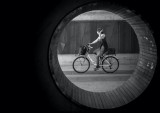
Gaan we straks met de hyperloop op vakantie, stappen we in een personendrone, of is de (elektrische) fiets hét vervoersmiddel van de toekomst? In vier artikelen zoekt NEMO Kennislink-redacteur Roel van der Heijden op welke transportmanieren we moeten inzetten. Sparen we het milieu of willen we zo snel mogelijk overal ter wereld zijn? Sommige keuzes gaan ten koste van elkaar, maar niet altijd. We definiëren steeds een nieuwe einddoel. Het eerste deel is: hoe maken we vervoer zo duurzaam mogelijk?
De (elektrische) fiets is in dit toekomstscenario doorgebroken als hét vervoersmiddel voor alle afstanden onder de pakweg twintig kilometer. Hij blijkt niet te verslaan als het om duurzaamheid gaat. Ga je iets verder dan pak je de elektrische auto of trein. Voor de echt lange reizen gebruiken mensen het vliegtuig op grotendeels synthetische brandstoffen uit duurzame stroom.
Klinkt dit scenario verrassend ‘gewoon’? De fiets, de auto en het vliegtuig als de vervoersmiddelen van de toekomst? Waar zijn de drones en hyperloops? Uit een rondgang van NEMO Kennislink bij een aantal duurzaamheids- en vervoersonderzoekers blijkt dat we het daar wat betreft duurzaamheid niet van moeten hebben.
Lees het artikel hier. In vervolgdelen nemen we op een vergelijkbare manier de snelheid, betaalbaarheid en het delen van vervoer onder de loep.
(foto Petar Milošević via CC BY-SA 4.0)
Work with the GreenTech Scale-up Vandebron

Vandebron is a scale-up in the energy world, with a mission to transform the energy market, starting with 100% green and local energy in the Netherlands. We are doing so by using state of the art technology that helps us distinguish ourselves from other utility providers. Our Digital team is looking for people that want to create a better world using software.
We create software that enables the energy transitions by balancing smart grids, facilitating electric mobility and producing more (local) green energy. Currently there are multiple open, technical positions:
Or also find some of our non-technical open positions here. Feel free to reach out to me in case you have any questions!
Note from ASC: Have a question? Let’s hear it in the comments.
Demoday: Energy meets Mobility

Demodays are part of our innovation process and intended to boost the progress of the various innovation projects, put requests for help on the table, share dilemmas and involve others in your projects or challenges. Invitations are sent but we're always open to adding a few new names to the list.
We host them every 8-10 weeks. During Demo days, community members pitch projects and ask for input and in small groups we work on concrete questions that our partners put on the table. We organize workshops with them and other partners to get a step further in the process. All in a very positive, open and cheerful vibe.
This time on the agenda:
Pitches:
Bottlenecks in Smart Energy - Royal Haskoning DHV
Smart energy is more flexibel; use, production and storage can be adjusted according to the need or capacity of the net. To get where we want to be we need to speed thins along. Royalhaskoning DHV presents research that show the bottlenecks.
Introduction Overmorgen - Arcadis
Overmorgen will be part of Arcadis. Both companies will join forces to make even more impact in realizing a sustainable living environment. As Overmorgen also becomes a Amsterdam Smart City partner via Arcadis it’s good to get to know each other.
CODE the streets - AMS Institute
Creating an app that makes cities less busy and saver, that’s wat CODE the Streets is doing. Our region keeps growing and the same goes for our streets, neighbourhood’s and cities so we constantly need to come up with smart ways to organize mobility.
Innovation partner subsidy - City of Amsterdam
To give the region an economic and sustainable transition boost, the city of Amsterdam has extra funds available. A chance for our network to get subsidy for the plans they work on.
Workshops:
• Knowledge platform Smart Energy - MRA bureau
• Smart mobility as a part of region development - Vervoerregio Amsterdam
• Neighbourhood participation learnings - Pakhuis de Zwijger
•. Improving energy infrastructure for cars at resting areas - Firan
Have a question? Let’s hear it in the comments!
Fossil Free Sweden: The Swedish Model for a Carbon-Neutral Economy

Sweden has passed a law to become fossil-free by 2045 and has created elaborate strategies to achieve this goal.
A plethora of policy and market mechanisms have been formed of which a special interest lies in the "green bonds" – a financing tool adopted widely across municipalities in Sweden, enabling large-scale investments in renewable energies and energy efficiency projects – mostly in Sweden, but also abroad.
With these mechanisms, Sweden is a leader in demonstrating a positive link between going fossil-free and a country’s prosperity and therefore increases the incentive to exit the fossil economy to move to a low-carbon economy.
Event Moderator: Avi Blau, Director of the Afeka Institute of Circular Engineering and Economy
Program:
14:00 - 14:05: Greetings
Mr. Erik Ullenhag, Ambassador of Sweden to Israel
14:05- 14:35: Introduction to fossil free policies in Sweden
Åsa Romson, former Minister for Climate and the Environment, current Senior researcher in environmental law and policy at IVL Swedish Environmental Research Institute - Sweden's fossil free policy
Örjan Lönngren, Policy Analyst, Energy and Climate at the City of Stockholm - fossil free policy In Stockholm
14:35 - 15:25: Swedish Industry Action for Climate Neutrality
Ms. Ann-Mari Fineman, Counsellor for Innovation Affairs Head of the Vinnova Office in Tel Aviv
City climate solutions by Sweden - transportation, grid, water treatment
Ronen Aharon, CEO at ABB Technologies Ltd. Israel
James Lundström, Head of Circular Economy at Volvo Cars
Erik Odén, CEO at C-Green Technology AB
Eva Stål, project leader biochar project , NSR AB
15:25 – 15:45: Green bonds - how can it be used to fund climate solutions
Göran Färm, Chairman of Kommuninvest Cooperative Society - Introduction to green bonds and their use in Sweden
Irene Svenonius, Chairman of the Board of Stockholm Region - Use of green bonds to fund climate projects in the city of Stockholm
15:45 - 16:15: Tel Aviv responses to climate change
Vered Crispin Ramati, Deputy Director of Environment & Sustainability Authority at Tel Aviv Municipality
The event is organized by the Embassy of Sweden in Tel Aviv in collaboration with Merhav - the movement for Israeli Urbanism
Don't forget to register.
The event is part of series of webinars by Merhav: "Cities at the Front of the Climate Crisis".
Round Table on Urban Insights and Mobility

Join the Swedish Chamber Executive Round Table discussion featuring Bas Dubois (Managing Director Benelux Volvo Bus) and Eugene Grüter (CEO Sweco Netherlands) on Urban Insights and Mobility.
When: Tuesday June 15
What time: 14.00 – 15.00
Greener cities
More than 70 percent of people in European cities breathe dangerous air, according to the European Environment Agency and 1 million deaths occur annually due to physical inactivity in Europe, states the World Health Organisation. The key to a healthier, more productive, greener and less polluted city could be a new planning and design strategy based on the idea of shared speed in urban space.
The pandemic has given us new perspectives and revealed the flaws in street space distribution and public space as it disrupted people’s travel behavior, compelling us to work from home, move shorter distances, and explore the city on a more local scale.
At the same time, about 70 percent of the global population – an astonishing 7 billion people – are expected to live in cities by 2050. With air pollution causing damage to human health and ecosystems, large parts of the population will not live in a healthy environment.
Speakers
Eugene Grüter
Grüter will share the outcome of the new Urban Insight report where Sweco envisions proximity, density, and shared speed as paths for transforming streets into incubators for health and well-being. “A core strategy of streets as health incubators entails treating the city’s various modes of transportation, from driving to walking, as more equal, a planning and design strategy that we call shared speed,” says David Lindelöw, transport planner at SWECO in Gothenburg, Sweden, and one of the report’s authors.
Bas Dubois
Dubois (Managing Director Benelux at Volvo Bus): "Just imagine a city with zero emission vehicles only; clean and silent. Since almost two decades Volvo buses is developing electromobility products and services for cities and in this presentation and Bas Dubois will take you on the journey Volvo buses has made and share the insights and experiences gained.”
Check start met belonen correct parkeren deelscooter

Elektrische deelscooter aanbieder Check introduceert vandaag als eerste aanbieder in Nederland een omvangrijk beloningsprogramma om correct gebruik van haar deelscooters te stimuleren. Alle gebruikers van Check doen automatisch mee en sparen vanaf vandaag op verschillende manieren voor gratis ritten. Een van de manieren om beloond te worden is het netjes parkeren van een deelscooter. Op die manier stimuleert Check haar gebruikers om op een verantwoorde manier om te gaan met de publieke ruimte. Dit draagt bij aan de uiteindelijke missie van Check - het leefbaarder maken van steden.
Gebruikers verdienen Coins met netjes parkeren
Het beloningssprogramma heet Coins en heeft een simpele structuur. Alle gebruikers doen automatisch mee en kunnen op verschillende manieren Coins verdienen. Bij 10 Coins krijgen ze de volgende rit gratis. Een van de manieren om een Coin te verdienen is door een positieve parkeerbeoordeling te ontvangen. Iedere gebruiker beoordeelt hoe de scooter door de vorige gebruiker is achtergelaten. Bij een positieve beoordeling ontvangt de vorige gebruiker een Coin. Met deze aanmoediging loont het voor gebruikers om na te denken over hun parkeergedrag en de scooter netjes achter laten. Er wordt niet alleen beloond. Als een gebruiker in een bepaalde periode drie keer een negatieve beoordeling heeft ontvangen volgt een tijdelijke blokkade van het platform.
Check investeert in gebruikers en niet-gebruikers
Gebruikers kunnen elkaar dus een beloning toekennen. Toch is Check niet bang voor hoog oplopende kosten. Paul van Merrienboer, mede-oprichter van Check, is juist blij als het programma op grote schaal wordt gebruikt: “Ons doel is om de makkelijkste weg door de stad aan te bieden. Niet alleen voor gebruikers van onze dienst maar voor álle inwoners van de stad. We bieden pas een echt duurzame oplossing als we met onze gebruikers extra oog hebben voor de schaarse publieke ruimte. We willen probleemloos integreren in steden en zien deze beloning als een investering in de toekomst.”
Een aanmoediging voor duurzame mobiliteit
Ook op andere manieren kunnen gebruikers Coins verdienen, bijvoorbeeld door het maken van een rit langer dan 10 minuten. Onderzoek door de gemeente Rotterdam wijst uit dat 23% van de deelscooterritten in 2020 een autorit verving. Om deze overgang verder aan te moedigen heeft Check eerder al een starttarief ingevoerd op iedere rit. Hierdoor zijn zeer korte ritten relatief duur. Vanaf vandaag worden langere ritten dus ook beloond met extra Coins. Hierdoor wil Check haar gebruikers stimuleren om nog vaker de auto te laten staan. Ook wil Check middels Coins de omloopsnelheid van deelscooters die lang stil staan vergroten. Door een lang stilstaande scooter te gebruiken ontvangen gebruikers Coins. Op deze manier wordt overlast voorkomen.
Zelf ontwikkelde technologie als oplossing
Check heeft het programma in korte tijd weten te ontwikkelen en implementeren. Marco Knitel, mede-oprichter van Check, licht toe: ‘We zien de urgentie van het probleem en omdat we ons platform zelf hebben gebouwd, waren we in staat het programma snel te ontwikkelen.’ In het ontwerpen van de oplossing zijn keuzes gemaakt waar Check trouw blijft aan haar belofte: de makkelijkste weg door de stad aanbieden. Knitel: ‘We willen zo min mogelijk verplichte schermen hebben tijdens het boeken van een rit. Dat proces moet intuïtief, snel en makkelijk zijn.’ Om deze reden is het niet verplicht om een geparkeerde scooter te beoordelen. Het gaat erom dat gebruikers leren herkennen wanneer er sprake is van een goed- of fout geparkeerde scooter en elkaar er in die gevallen op aanspreken.
Metropolitan Mobility Podcast | Barcelona Superblocks!

How did Poblenou in Barcelona turn into a green oasis? Superblocks!
“I think it is impossible to be against Superblocks.” Silvia Casorran (Deputy Chief Architect at the Barcelona City Council) and Patrick Kappert (member of neighbourhood organisation Collective Superblock Poblenou) speak with Geert Kloppenburg about the Superblocks of Barcelona. They discuss:
- How the Superblocks started
- Why everyone is talking about Superblocks
- How living in a Superblock changed their lives
Interested in more best practices in EU cities? Register here for the Celebrating Cycling Cities event 1st of June, with a.o. Stientje van Veldhoven en Frans Timmermans!
Help! My grid is congested

We proudly invite you to the EV Energy Final Conference happening on 12 May 2021 from 9:30 am - 11:30 am online.
Over four years of project implementation. It's been a long and exciting journey for all of us. Along the way we have been able to share our experience, learn from each other and implement successful practices in our regions.
Our final conference presents how practical experiences and regional policy incentives were shared and led to new insights, policy recommendations and running action.
Cities and regions are on the path towards clean mobility, made possible by local renewable energy. We present 5 EU-cities and regions (Amsterdam, Barcelona, Kaunas, Rome and Stockholm), which have been actively collaborating in transition efforts, sharing learnings from policy making, planning and implementation. Although the stages of development vary between these cities, this collaboration has been very fruitful and inspirational.
The event is dedicated to policy makers, project teams, CPO’s, energy companies and local initiatives aimed at adopting renewable energy as a pillar in their future actions.
The impact of COVID-19-lockdown on EV charging
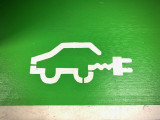
With the lockdown, traffic in the Netherlands largely came to a halt. Electric vehicles were no exception. What are the consequences for the use of public charging infrastructure? And how has the charging behaviour of electric drivers changed? Rick Wolbertus, researcher of the Future Charging project at the Hogeschool van Amsterdam (AUAS), about an initial analysis of the changed use of public charging points. 'Working from home not only makes a difference in traffic jams, it especially had a positive impact on peak loads on the electricity grid.'
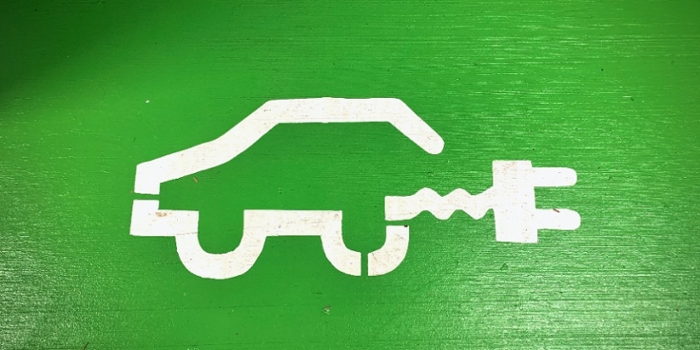
Image: Ralph Hutter / Unsplash
After the lockdown on March 12 2020, there was a lot less driving. Of course, this also applies to electric vehicles. In the Netherlands, about 50% less car driving and that is also reflected in the number of kWh that is charged at public charging stations. It is striking that the use of fast chargers fell faster than the use of level 2 stations. Level 2 stations were used about half as much while the use of fast charging stations (in the city) became about 80% less. The reference date for these numbers is the 3rd of February (February 1st is a Saturday).
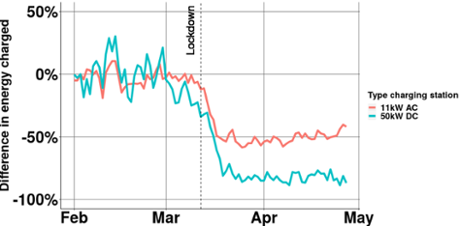
In the second figure, we compare shared cars with regular users. It is striking that shared cars keep pace with private use in the number of kWh charged. Although these cars are used by several people, there seems to be no additional fear of getting infected in shared cars.
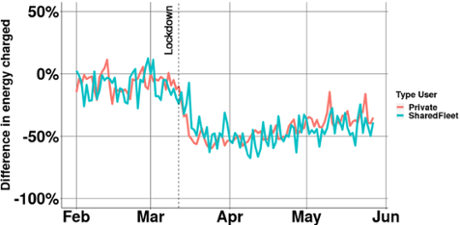
The third figure also shows that slowly traffic levels are returning back to normal. In particular, the number of different users is slowly returning to the pre-corona level. At the end of May, there were only 20% fewer users than before the lockdown. For the total energy that is charged, so the number of kilometers driven, we see that this is falling slightly behind. Compared to mid-March, there is already 10% more loading at the end of April.
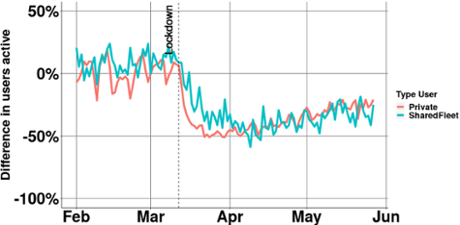
In terms of charging behavior, we also see a change, especially in the average time that a car is connected. For regular users, this average was around 10 hours, but in corona time it jumped to 15 hours, with some outliers on weekends. This was to be expected and is still relatively low compared to the decreased number of kilometers driven. In addition, the downward trend has started again. It is also positive that the connection time for shared cars is almost back to normal. It is clearly visible
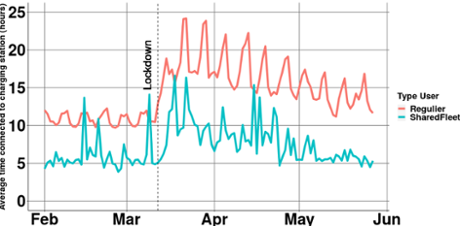
It is also striking that the that time when EV drivers charge has changed since the lockdown. Especially the peak in the evenings has become a lot less. At the same time, more is charged especially during the day. So EV drivers go for (electric) rides to the super or hardware store, but commuter traffic has decreased a lot. In addition, all traffic is spread out during rush hours. Even after the lockdown eased after May 11, this trend is still visible. The trend towards more working from home therefore also has a significant (positive) impact on energy demand, especially during peak hours. Working from home therefore saves both traffic jams and peak loads on the electricity grid.
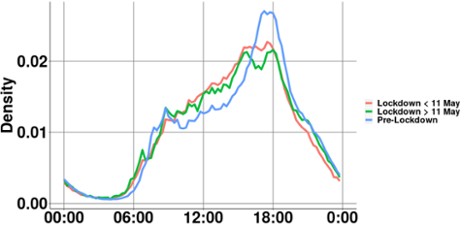
In conclusion, we see that electric transport is hit as hard by the corona crisis as transport in general. It is striking that fast chargers are used less than regular charging stations. Fast charging often shows in previous research in addition to regular charging, to cover longer distances in one day. The sharp fall in the need for fast charging can indicate a significantly reduced daily driving distance for many drivers such as taxis. Cars will stay connected to the charging station longer than before, but less than might be expected. The trend towards charging behavior before the corona crisis seems to have started again.
More information?
Project page Future Charging
Centre of Expertise Urban Technology
Research on Energy Transition
Social: Twitter, LinkedIn en Facebook
Sign up for the EIT Urban Mobility Accelerator program

Be part of the EIT Urban Mobility Accelerator and get unique access to cities, mobility players and investors! The application phase for the EIT Urban Mobility Accelerator program batch #3 is now open!
The EIT Urban Mobility Accelerator is a EU-funded program in five European regional hubs implemented through partners to take early-stage mobility startups to the next level.
They are looking for teams with business ideas to:
• Reduce congestion and increase efficiency in the transport system
• Make commuting faster or more enjoyable with an innovative approach
• Accelerate the transition to low- or zero-emission forms of transport
• Help solve all other mobility-related problems.
The benefits of joining the EIT Accelerator program:
• 5,000 euro in equity-free funding for your startup
• 6-month Accelerator program with coaching and contacts to customers & investors
• Direct access to “living labs” and cities for the creation of new products and services
Who can apply?
We are looking for early-stage startups from EU Member States and H2020 Associated Countries with at least 2 FTE, a properly validated, clear, scalable and innovative business idea that solves a mobility-related customer problem. Registration for the program is possible until may 9 2021.
You can sign up for the EIT Urban Mobility Accelerator Program
Mini Docu: 'Transparent Charging Station'

Algorithms are becoming increasingly important. For example, they influence how electricity is distributed amongst car charging stations. But during peak hours, who is allowed to load first and at what speed? And how do you know - as a user - what is happening and if the choices made are fair? To find answers to these questions, the Transparent Charging Station project was started in 2017. A short documentary on this topic has premiered on March 18th 2021.
Documentary 'Transparant Charging Station'
In this short documentary, six experts talk about the origin, development and future of the Transparent Charging Station. The documentary was made possible by Knowledge and Innovation Center ElaadNL, Municipality of Amsterdam, Amsterdam Institute for Advanced Metropolitan Solutions, The Incredible Machine and TU Delft.
With: designer Marcel Schouwenaar, initiator Thijs Turèl, scientist Kars Alfrink, Smart Mobility expert Ruben Polderman, behavioral researcher Lotte Gardien and software engineer Ton Smets.
📣 Solar Energy needs Smart Inverters 📣

Commissioned by the FAN foundation, I set up a study into the connectivity of residential PV inverters in The Netherlands, which was conducted with our research partner Delta-EE.
Many residential PV inverts offer some sort of Smart Energy insight, and many newer inverters offer remote control. Yet there are some great challenges that hinder optimal use of solar energy.
• Awareness on the existence of smart functionalities of inverters, and on possible benefits, is low.
• Even today, not all new installs are smart inverters. These inverters will remain operational for 10 – 15 years, or longer.
• The use of smart functionalities of inverters by the energy sector is still in its infancy.
These are some of important findings from our research, that are also relevant for other countries.
According to the FAN foundation, this is a missed opportunity. With the expected growth of residential PV systems in the future, and the upcoming replacement market for older systems, FAN calls on installers and suppliers to supply as many smart inverters as possible.
You can read more about this research and download the full report, in English or in Dutch.
You can also download 2 other researches I carried out in the FAN Flexmonitor series: Smart EV chargers and Smart Heatpumps.
Marktconsultatie: Flexibel elektriciteitsnet Amsterdam-West

In Amsterdam gaat er de komende jaren veel gebeuren. Door verschillende ontwikkelingen op het gebied van industrie, woningbouw, datacenters, mobiliteit en de warmtetransitie ontstaat er een grote opgave voor het energiesysteem in Amsterdam. Daarom verkent Liander samen met gemeente Amsterdam de mogelijkheden die de markt te bieden heeft op het gebied van toepassingen voor een flexibel en efficiënt elektriciteitsnet. Dit doen we in de vorm van een marktconsultatie.
Met deze marktconsultatie verwachten Liander en gemeente Amsterdam een beter beeld te krijgen van de mogelijkheden van flex-oplossingen. Onder flex-oplossingen verstaan we: oplossingen die bijdragen aan een efficiënt energiesysteem door het optimaliseren van vraag en aanbod zodat de gevraagde transportcapaciteit op het net wordt gereduceerd. Door gebruik te maken van deze slimme oplossingen voorkomen we onnodige en kostbare netuitbreidingen en mogelijke knelpunten op het net. Op deze manier streeft Liander er naar om meer klanten sneller van capaciteit te voorzien.
Meedoen? Klik op de onderstaande links voor alle benodigde documenten en informatie!
https://innovatiepartners.nl/project/flexibel-elektriciteitsnet-amsterdam-west
https://www.liander.nl/marktconsultatieAmsterdamwest
Metropolitan Mobility Podcast with Karen Vancluysen (Polis Network)
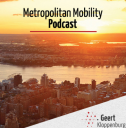
How can local governments deal with (technological) innovations? Listen to the #podcast with Karen Vancluysen of POLIS Network: https://bit.ly/mobilitypod
De sociale en maatschappelijke kanten van Smart Energy.

Interesse in de sociale en maatschappelijke kanten van Slimme Energieoplossingen? Meld je aan voor het 5e webinar van de Smart Energy Community op 20 april 2021 om 15.00 uur!
We beginnen met de acceptatie van slimme energiediensten door Tristan de Wildt van
Technische Universiteit Delft. Tristan gaat in op de sociale kant van Smart Energy.
Vervolgens hebben we twee inspirerende PowerPitches:
* Fardau van der Galiën vertelt hoe Vandebron de wensen van de klant samenbrengt met de technische mogelijkheden van slimme energiediensten zonder in te leveren op
gebruiksgemak.
* Jurgen Duivenvoorden vertelt over het pilotproject ‘altijd groen’ in de Ecowijk
Mandora, en hoe Greenchoice helpt om mensen ook groene energie te laten
gebruiken als het windstil is en de zon niet schijnt.
We sluiten af met Tomas ter Reehorst van econic. Een maandelijks bedrag voor
warmtepomp, zonnepanelen, batterij en laadpaal, in samenhang met slimme energiediensten, hoe werkt dat?
Programma en aanmelden voor 20 april 2021, 15.00 – 16.00 uur:
https://www.smartenergycommunity.nl/webinar20april2021
Dit evenement is in het Nederlands.
Urban Mobility Hackathon

Have an idea how to improve urban mobility and reduce pollution? Join Urban Mobility Hackathon on April 15-17!
Clean mobility is more important now than ever. Actually, it should’ve been here already 20 years ago. The transport sector currently accounts for 20% of total CO2 emissions, and in combination with the joint target of climate neutrality by 2050, there’s extremely fertile grounds for clean mobility innovations.
In this 48-hour hackathon, we’re looking to find innovative solutions within the scope of challenges proposed down below. Professionals and students who are interested in sustainability, technology, and innovation are invited to participate in the hackathon by joining a team or creating their own. We will guide you through all the steps of the hackathon, from idea submission to mentoring and final presentations to the jury for the selection of winners.
Top 3 most promising solutions will be awarded monetary prizes to aid further solution development!
 1st place - 3 000 Eur
1st place - 3 000 Eur 2nd place - 2 000 Eur
2nd place - 2 000 Eur 3rd place - 1 000 Eur
3rd place - 1 000 Eur
Register at www.urbanmobility.io <span >until April 12th for a chance to make our cities greener! Once you register as a participant, you will have access to the Participant area chat straight away to start brainstorming.</span>
Moreover, the hackathon is not a stand-alone event, but will kick off 10-week summer incubation program devoted to mobility innovations. Get the first idea validation in the hackathon and take it further by applying to Urban Mobility Incubator!
Urban mobility hackathon is organized by the first innovation district VEFRESH, City of Riga, Institute of Electronics and Computer Science, Teikums co-working and EIT Urban Mobilty. The event's lead partner is the Embassy of the Netherlands in Latvia, and it is supported also by Accenture Latvia and Latvia's largest telecommunications operator LMT.
This project is funded by EIT Urban Mobility, an initiative of the European Institute of Innovation and Technology (EIT), a body of the European Union. EIT Urban Mobility acts to accelerate positive change on mobility to make urban spaces more liveable. Learn more: www.eiturbanmobility.eu
Interview in bijlage FD met mobiliteitsexpert Geert Kloppenburg

Kansen en mogelijkheden deelauto- en deelfietssystemen en ophouden om mobiliteitssysteem op piekmomenten te blijven organiseren op zowel weg als spoor.
Lees het artikel hier: http://bit.ly/FDgeert
Stay up to date
Get notified about new updates, opportunities or events that match your interests.

